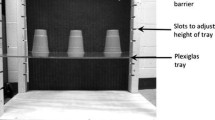Abstract
Recent empirical work has suggested that some species of non-human primates may be aware of their knowledge states. One finding to support this claim is that they seek information about the location of a hidden food item when they are unsure of its location, but not when they already know where it is, which purportedly demonstrates metacognition. However, this behaviour may instead reflect a generalized search strategy, in which subjects reach for food when they see it, and search for it when they do not. In this experiment, this possibility was addressed by testing orangutans in three conditions in which the location of a food item was sometimes known to subjects, and other times required subjects to visually seek the missing information. All subjects exhibited behaviour consistent with a metacognitive interpretation in at least two of the three conditions. Critically, in two of the conditions, subjects refrained from seeking visual information, and correctly found the hidden food item without ever seeing it, using inference by exclusion. The results suggest that animals that succeed in this information-seeking task are not merely acting according to a generalized search strategy, and instead seek information adaptively according to their knowledge states.






Similar content being viewed by others
References
Barth J, Call J (2006) Tracking the displacement of objects: a series of tasks with Great apes and young children. J Exp Psychol Animal Behav Proc 32:239–252
Basile BM, Hampton RR, Suomi SJ, Murray EA (2009) An assessment of memory awareness in tufted capuchin monkeys (Cebus apella). Animal Cognition 12:169–180
Beran MJ, Redford JS, Washburn DA (2006) Rhesus monkeys (Macaca mulatta) monitor uncertainty during numerosity judgements. J Exp Psychol Animal Behav Proc 32:111–119
Beran MJ, Smith JD, Coutinho MVC, Couchman JC, Boomer J (2009) The psychological organization of “uncertainty” responses and “middle” responses: a dissociation in capuchin monkeys (Cebus apella). J Exp Psychol Animal Behav Proc 35:371–381
Call J (2004) Inferences about the location of food in the great apes (Pan paniscus, Pan troglodytes, Gorilla gorilla, and Pongo pygmaeus). J Comp Psychol 118:232–241
Call J (2005) The self and other: a missing link in comparative social cognition. In: Terrace HS, Metcalfe J (eds) The missing link in cognition: origins of self-reflective consciousness. Oxford University Press, New York, pp 321–341
Call J (2006) Inferences by exclusion in the great apes: the effect of age and species. Animal Cognition 9:393–403
Call J (2010) Do apes know that they could be wrong? Animal Cognition 13:689–700
Call J, Carpenter M (2001) Do apes and children know what they have seen? Animal Cognition 4:2007–2220
Carruthers P (2008) Meta-cognition in animals: a skeptical look. Mind Language 23:58–89
Crystal JD, Foote AL (2009) Metacognition in animals. Comp Cog Behav Rev 4:1–16
Foote AL, Crystal JD (2007) Metacognition in the rat. Curr Biol 17:551–555
Fujita K (2009) Metamemory in tufted capuchin monkeys (Cebus apella). Animal Cognition 12:575–585
Hampton R (2001) Rhesus monkeys know when they remember. Proc Nat Acad Sci USA 98:5359–5362
Hampton RR (2009) Multiple demonstrations of metacognition in nonhumans: converging evidence or multiple mechanisms? Comp Cog Behav Rev 4:17–28
Hampton RR, Zivin A, Murray EA (2004) Rhesus monkeys (Macaca mulatta) discriminate between knowing and not knowing and collect information as needed before acting. Animal Cognition 7:239–246
Inman A, Shettleworth SJ (1999) Detecting metamemory in nonverbal subjects: a test with pigeons. J Exp Psychol Animal Behav Proc 25:389–395
Jozefowiez J, Staddon JER, Cerutti DT (2009) Metacognition in animals: how do we know that they know? Comp Cog Behav Rev 4:29–39
Kornell N, Son LK, Terrace HS (2007) Transfer of metacognitive skills and hint seeking in monkeys. Psychol Sci 18:64–71
Marsh HL, MacDonald SE. Short-term spatial memory in orangutans. (Unpublished data)
Marsh HL, MacDonald SE. Orangutans ‘play the odds’: Information-seeking strategies in relation to cost, risk, and benefit. (Under revision)
Morgan CL (1906) An introduction to comparative psychology. W. Scott, London
Nakamura N, Watanabe S, Betsuyaku T, Fujita K (2011) Do birds (pigeons and bantams) know how confident they are of their perceptual decisions? Animal Cognition 14:83–93
Nelson TO (1996) Consciousness and metacognition. Am Psychol 51:102–116
Paukner A, Anderson JR, Fujita K (2006) Redundant food searches by capuchin monkeys (Cebus apella): a failure of metacognition? Animal Cognition 9:110–117
Redford JS (2010) Evidence of metacognitive control by humans and monkeys in a perceptual categorization task. J Exp Psychol Learn Mem Cog 36:248–254
Shields WE, Smith JD, Washburn DA (1997) Uncertain responses by humans and rhesus monkeys (Macaca mulatta) in a psychophysical same-different task. J Exp Psychol Gen 126:147–164
Smith JD (2009) The study of animal metacognition. Tre Cog Sci 13:389–396
Smith JD, Schull J (1989) A failure of uncertainty monitoring in the rat. (Unpublished data)
Smith JD, Schull J, Strote J, McGee K, Egnor R, Erb L (1995) The uncertain response in the bottlenosed dolphin (Tursiops truncates). J Exp Psychol Gen 124:391–408
Smith JD, Shields WE, Schull J, Washburn DA (1997) The uncertain response in humans and animals. Cognition 62:75–97
Smith JD, Shields WE, Allendoerfer KR, Washburn DA (1998) Memory monitoring by animals and humans. J Exp Psychol Gen 127:227–250
Smith JD, Beran MJ, Couchman JJ, Coutinho MVC, Boomer JB (2009) Animal metacognition: problems and prospects. Comp Cog Behav Rev 4:40–53
Smith JD, Redford JS, Beran MJ, Washburn DA (2010) Rhesus monkeys (Macaca mulatta) adaptively monitor uncertainty while multi-tasking. Animal Cognition 13:93–101
Sole LM, Shettleworth SJ, Bennett PJ (2003) Uncertainty in pigeons. Psychon Bull Rev 10:738–745
Staddon JER, Jozefowiez J, Cerutti DT (2007) Metacognition: a problem, not a process. PsyCrit 1–5
Suda-King C (2008) Do orangutans (Pongo pygmaeus) know when they do not remember? Animal Cognition 11:21–42
Sutton JE, Shettleworth SJ (2008) Memory without awareness: Pigeons do not show metamemory in delayed matching to sample. J Exp Psychol Animal Behav Proc 34:266–282
Acknowledgments
We thank Catherine Reeve, Diana Marsilio, Bev Carter, and the Toronto Zoo staff for their support and assistance with this research. In addition, we thank Andrew Marsh for his assistance with the apparatus construction.
Author information
Authors and Affiliations
Corresponding author
Electronic supplementary material
Below is the link to the electronic supplementary material.
Rights and permissions
About this article
Cite this article
Marsh, H.L., MacDonald, S.E. Information seeking by orangutans: a generalized search strategy?. Anim Cogn 15, 293–304 (2012). https://doi.org/10.1007/s10071-011-0453-y
Received:
Revised:
Accepted:
Published:
Issue Date:
DOI: https://doi.org/10.1007/s10071-011-0453-y




